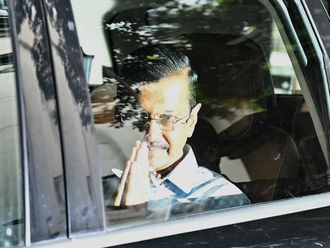Damned if you do, damned if you don’t. Perhaps nothing exemplifies that awkward position between a rock and a hard place that the Indian opposition finds itself in more than the Ram Temple inauguration next week.
The Congress declined the invitation to attend the ceremony in Ayodhya on the 22nd of January, stating that the inauguration of the incomplete temple by the leaders of the BJP and the RSS “has been obviously brought forward for electoral gain.”
On the face of it, that seems to have been the wise thing to do. After all, the temple inauguration is not simply a matter of faith but also a political event that the BJP is seeking to play up ahead of the general elections.
Rahul Gandhi broke his silence on the issue this week on his Yatra, where he defended his party’s decision to decline the temple event invite, calling it a “completely political Narendra Modi function.”
Congress' dilemma
What the Congress should do, however, is take a leaf out of Sharad Pawar’s book. The veteran politician and NCP leader also declined an invitation to attend the ceremony but framed it more smartly, saying he would visit Ayodhya when the temple was fully ready and that Ram is a matter of faith for millions.
The Congress and some other Indian allies are facing a very big dilemma. For example, in Kerala, ‘The Indian Express’ has reported how the state Congress is now worried it may have upset its Hindu vote base after two prominent Hindu organisations in the state called for celebrations on the 22nd of January.
One of them is the Kerala Hindu outfit, the Nair Service Society or the NSS, which said a boycott of the event, based on politics, would amount to “blasphemy.”
The NSS has been known to be pro-Congress in Kerala, and the party has prominent leaders like Shashi Tharoor who belong to the Nair community.
In Madhya Pradesh too, the Congress is planning a number of events to mark the temple inauguration, including a Ram festival for 21 days and a bike rally to Ayodhya. Several Congress leaders in their individual capacity have said they will attend the ceremony.
This also reflects a deeper ideological confusion within the Congress. During the recent Madhya Pradesh state elections, the party’s senior leader Kamal Nath openly played the soft Hindutva card.
He even suggested at one point that India had become a Hindu rashtra. And how do we forget that it was Rajiv Gandhi who originally opened the locks to the Ram Janmabhumi-Babri Masjid site.
Trump card for 2024
For the Congress, it is a reflection of a growing dilemma: how to retain its minority vote bank without upsetting Hindu sentiments.
In fact, internal reports of the Congress after the 2014 Modi win attributed their loss to the perception that the Congress was a “minority appeasement” party. There are no easy answers as to how this should be handled.
Mamata Banerjee has announced a multi-faith event on the 22nd of January instead, where she will visit the Kalighat temple in Kolkata and also hold a rally with people of different communities, covering temples, mosques, gurdwaras, and churches.
Arvind Kejriwal has announced that he will go to Ayodhya after the ceremony, while Uddhav Thackeray has said he will be doing a puja at the Kalaram temple in Nashik.
The BJP has gleefully tried to paint the entire opposition as “anti-Hindu,” and the opposition’s decision to stay away from the temple event is a risky decision. But in the end, it was the right thing to do.
This balancing act however is tricky. Politics today is about pragmatism and perception more than idealism. This is the cold hard truth. How the opposition handles the temple issue from here will be the key.
For the Prime Minister, it’s a win-win. He is clearly the face of Hindutva and Hindu nationalism, and the Ram Mandir is an emotive issue that also distracts from more basic things like jobs and inflation.
For the BJP, the Mandir is the trump card for 2024.








_resources1_16a45059ca3_small.jpg)

